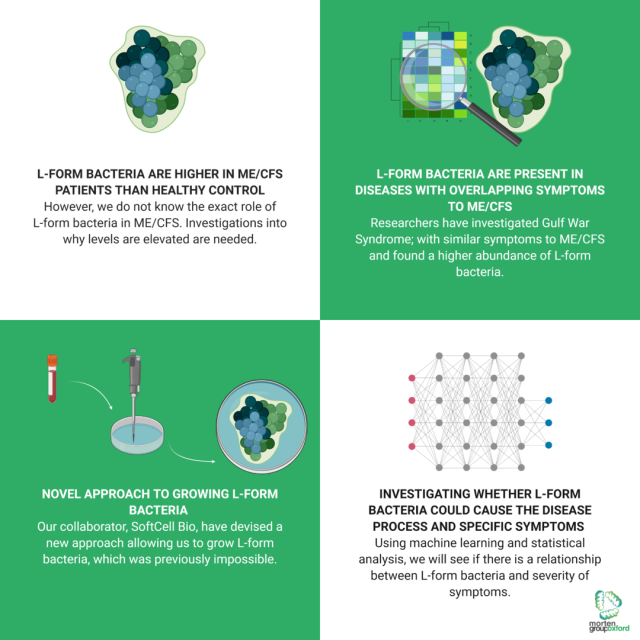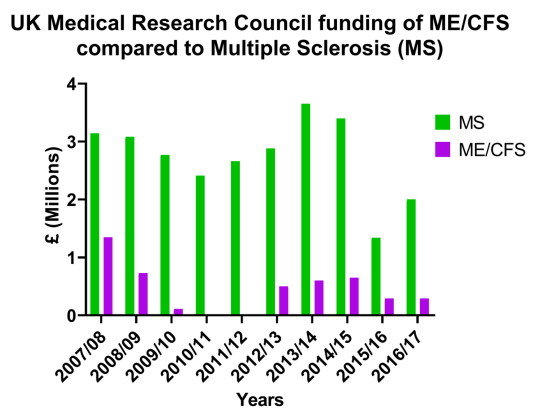Myalgic encephalomyelitis/chronic fatigue syndrome (ME/CFS), Chronic Lyme Disease, Long Covid and PANS PANDAS affect over 100 million people worldwide, but remain a puzzle to doctors. The diagnosis of ME/CFS and Chronic Lyme Disease is difficult and their causes are uncertain. Long Covid - a new condition associated with Covid 19 - can potentially help us unlock other conditions associated with infections. PANS PANDAS is often miss-diagnosed as a functional neurological disorder because we have been unable to identify a causal agent.
Research into the causes of the above conditions has been limited due to lack of funding or the fact they are completely new conditions. We have recently identified clear differences in various factors in the blood of ME/CFS patients that suggest an underlying biological cause.
Dr Karl Morten at the University of Oxford is focusing his research on ME/CFS, Long Covid, Chronic Lyme Disease, PANS PANDAS and how these illnesses may connect to each other.
Low cold temperature (Cryotherapy) project
This project is part of a long-term collaboration with Professor Pawel Zalewski (Collegium Medicum in Bydgoszcz Nicolaus Copernicus University in Torun). Pawel’s group have run and published a series of excellent papers investigating the physiology and impact of treatments in ME/CFS. In order to identify “candidate” causal elements in a condition like ME/CFS you really need to observe changes in patient’s symptoms which correlate with a disease associated variable. Just comparing ME/CFS patients with a control group or other similar conditions at a single time point will not identify causal elements and just give you an association. ME/CFS and similar conditions such as fibromyalgia and Long Covid are at best linked to associated markers.
Our Oxford based studies are identifying lots of associations (Diagnosis of Myalgic Encephalomyelitis/Chronic Fatigue Syndrome with Partial Least Squares Discriminant Analysis: Relevance of Blood Extracellular Vesicles | Medicine (frontiersin.org). How do we move from associations to identify causal elements which could lead us to novel treatment targets? Pawel’s whole-body cryotherapy (WBC) project is an extremely valuable source of information. Both patients and controls enjoyed participating in the cryotherapy programme which involved 10 exposures over 10 days to short bursts of extreme cold (Changes in the Allostatic Response to Whole-Body Cryotherapy and Static-Stretching Exercises in Chronic Fatigue Syndrome Patients vs. Healthy Individuals (mdpi.com) . Unlike a Structured Exercise programme (SEP) (Prediction of Discontinuation of Structured Exercise Programme in Chronic Fatigue Syndrome Patients (mdpi.com) (Relationship between Cardiopulmonary, Mitochondrial and Autonomic Nervous System Function Improvement after an Individualised Activity Programme upon Chronic Fatigue Syndrome Patients (mdpi.com) all patients and controls completed the 10 day programme. Some patients showed symptom improvement for 3 months with symptoms reverting to baseline levels after 12 months (unpublished data). Although not a cure, cryotherapy could offer (i) short term treatment and more importantly (ii) give us unique insights into the potential causal elements in the disease. Which biological variable changes when patients improve? Do these same variables go back to disease levels when patients get worse? Are these the same for all patients?
Metabolomics is a relatively new technique which looks at all the chemicals in a blood sample. Cells are removed and we study the chemicals which originate from unknown organs in the body. We are looking for a signature which could (i) tell us if someone has ME/CFS or (ii) tell us which chemicals link to increased or decreased symptoms. The whole-body cryotherapy cohort of thirty-two ME/CFS patients meeting the Fukuda criteria for ME/CFS have also had a wide range of clinical test at each time point. The gut microbiome in the same subjects has already been assessed at each time point. This new study will investigate the plasma metabolomics profile working with the National Phenome centre in UK (Home - National Phenome Centre). Both targeted and untargeted profiling will be used. Targeting identifies known chemical signatures and allow us to compare to previous studies. Untargeted is more compound discovery and will look for differences in any chemical in the sample. Approach to work on untargeted molecules is more challenging but has the potential to unearth “golden” molecules in the sample. These “golden” molecules if linked to improvements or worsening of symptoms can be identified and explored as potential therapeutic targets.
Speed and cost of the study: Our previous work with metabolomics although identifying interesting insights into the condition due to lack of resources has been slow. Jamie Strong in the Morten group has been leading the research efforts and has done a marvellous job. Jamie came into the group with no research experience and continues to suffer with ME/CFS. He supports the team in translating the experience of ME/CFS symptoms to setting an approach for research into the molecular underpinnings of this debilitating disease. Although Jamie’s research skills have excelled substantially, Jamie still has ME/CFS and for the last 18 months has been taking on the part-time Oxford University MSc in Medical statistics course. Although Jamie has little time now we are keen to get him back in the future! The National Phenome Centre is an MRC NIHR funded resource which will allow us to have a much faster turn-around time for our samples. Our data will be back in 6 months which will allow us to work with the data and integrate it with the other data generated on the same samples and patients. This is a much faster approach than our poorly funded metabolomics studies which after several years are just coming to the paper drafting stage.
Total cost of the study
£38,500
Biomarkers project
This project builds on our work with Raman micro-spectroscopy and our collaboration with Professor Elisa Oltra (Universidad Catolica de Valencia San Vicente Martir – UCV). Raman micro-spectroscopy is a label free approach examining the molecular finger print of sample. Differences are observed in peripheral blood mononuclear cells (PBMC) in ME/CFS patients relative to healthy controls and individuals with multiple sclerosis (manuscript in preparation). Our recent study with Elisa’s group showed that a combination of miRNAs present in PBMC and some physical properties of extra-cellular vesicles (EV) from plasma was able to distinguish severe ME/CFS patients from controls with 100% accuracy (Frontiers | Diagnosis of Myalgic Encephalomyelitis/Chronic Fatigue Syndrome with Partial Least Squares Discriminant Analysis: Relevance of Blood Extracellular Vesicles | Medicine. We would like to expand this to mild and moderate patients in order to explore the potential of examining these markers as a diagnostic test.
Budget required. PBMC’s and plasma, will be acquired from ME/CFS patients and healthy controls and used to carryout miRNA and EV characterisation. £27,500 is required for miRNA screening based on markers identified in our Frontiers paper on 100 samples including 60 ME/CFS patients and 40 healthy controls. EV’s characterisation will be carried out by existing PhD students in Oxford and Valencia.
Total cost of the study
£27,500
Longitudinal study
Most studies to date are cross sectional, which means they make observations at one time point and compare patients with healthy controls and other disease groups. This approach can only identify an association, but not causality. A Longitudinal study collects samples and clinical data at several times (minimum of 4) and links biological measures to later changes in symptoms. This approach is similar to the Low cold temperature study but without an intervention. We are planning to run a Longitudinal study in the PhD research project being carried out by Dr Inga Williams. This will increase the size of the study. We are looking for £30,000 to recruit a part time researcher to help to process the blood samples over 18 months, in order to allow Inga to spend more clinical time with participants. Because resources are limited and we need to see a natural shift in the symptoms to have a chance of picking up key biological factors, we have decided to include 50 patients from the Long Covid cohort in the study taking blood and clinical assessments at 4 time points. ME/CFS and long Covid have similar symptoms, but the symptoms may change naturally over shorter time-scales in Long Covid.
Total cost of the study
£33,000
Long Covid looking for alterations in extracellular vesicles and PBMCs: a pilot study
This study will be run by Miss Edie Guo and we are longing for funding to cover running costs and Edie’s stipend. Samples from this project will come from our new Long Covid project led by Dr Inga Williams. Raman spectroscopy will be used to compare PBMC and extracellular vesicles form Long Covid and ME/CFS patients and healthy controls.
Total cost of the study
£11,000
Oxford University PANS PANDAS deep whole genome sequencing study
One of our major hypothesis in ME/CFS is that L-Form pathogens, a persistent form of bacteria are somehow involved in the pathogenesis of the condition. In an L-Form state pathogens are found in cells and tissues but are invisible to the human immune system. Special protocols are required for culturing and they cannot be identified in standard bacterial laboratory tests. PANS PANDAS is similar in many ways. PANDAS patients having evidence of initial Streptococcal infection while PANS have no clear bacterial connection. Like ME/CFS, PANS PANDAS patients have evidence of a gut disturbance/altered microbiome which we believe might be a way in for the pathogens.
We plan to investigate 20 individuals from 4-5 families with PANS PANDAS. In each family we will be looking for 2 individuals affected with PANS PANDAS ideally with evidence that antibiotics treatment has been successful in the past. Other family members not affect by PANS PANDAS will also be included in the study. We will be looking for 2 affected and 2 unaffected individuals from each family. Blood will be taken, DNA extracted and used for deep whole genome sequencing to detect low levels of bacterial, fungal and viral pathogens. Very deep sequencing is expensive at £600-800 per sample. Once organisms have been identified we will i) reduce the depth of sequencing to see if pathogens are detectable using cheaper approaches and ii) attempt to enrich the samples for bacterial pathogens. Pathogen enrichment, if successful, once we know what we are looking for, can be carried out for around £100 per sample
Total cost of the study
£33,000
We need your help to achieve our fundraising goals, so that we can support ME/CFS, Chronic Lyme Disease and Long-COVID research at Oxford University.
Donate now by clicking the button below.
By clicking "Donate now", you will be passed through to the University of Oxford's donation page.
You can make a single or recurring gift and UK tax-payers may reclaim tax on this donation depending on the tax threshold.




